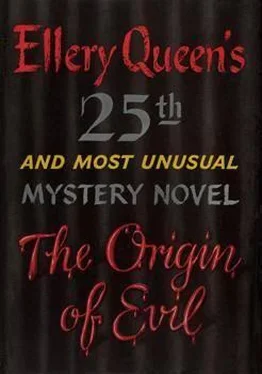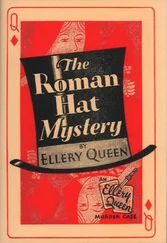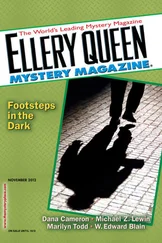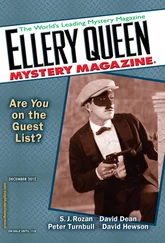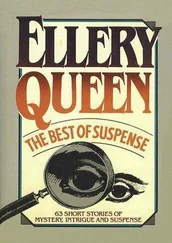“Yes. Why doesn’t Mrs. Williams answer it?” Ellery said with irritation. Then he laughed. “She isn’t answering it because I gave her the afternoon off. I’d better go in.”
“Wait.” Keats turned his motor off and vaulted to the road. “Maybe it’s my office. I told them I might be here.”
Ellery unlocked the front door and went in. Keats straddled the threshold.
“Hello?”
Keats saw him stiffen.
“Yes, Delia.”
Ellery listened in silence. Keats heard the vibration of the throaty tones, faint and warm and humid.
“Keats is with me now. Hide it till we get there, Delia. We’ll be right over.”
Ellery hung up.
“What does the lady want?” asked Keats.
“She says she’s just found another cardboard box. It was in the Priam mailbox on the road, apparently left there a short time ago. Priam’s name handprinted on it. She hasn’t told Priam about it, asked what she ought to do. You heard what I told her.”
“Another warning!”
Keats ran for his car.
Keats stopped his car fifty feet from the Priam mailbox and they got out and walked slowly toward it, examining the road. There were tire marks in profusion, illegibly intermingled. Near the box they found several heelmarks of a woman’s shoe, but that was all.
The door of the box hung open and the box was empty.
They walked up the driveway to the house. Keats neither rang nor knocked. The maid with the tic came hurrying toward them as he closed the door.
“Mrs. Priam said to come upstairs,” she whispered. “To her room.” She glanced over her shoulder at the closed door of Roger Priam’s den. “And not to make any noise, she said, because he’s got ears like a dog.”
“All right,” said Keats.
Muggs fled on tiptoe. The two men stood there until she had disappeared beyond the swinging door at the rear of the hall. Then they went upstairs, hugging the balustrade.
As they reached the landing, a door opposite the head of the stairs swung in. Keats and Ellery went into the room.
Delia Priam shut the door swiftly and sank back against it.
She was in brief tight shorts and a strip of sun halter. Her thighs were long and heavy and swelled to her trunk; her breasts spilled over the halter. The glossy black hair lay carelessly piled; she was barefoot ― her high-heeled shoes had been kicked off. The rattan blinds were down and in the gloom her pale eyes glowed sleepily.
Keats looked her over deliberately.
“Hello, Ellery.” She sounded relieved.
“Hello, Delia.” There was nothing in his voice, nothing at all.
“Don’t you think you’d better put something on, Mrs. Priam?” said Keats. “Any other time this would be a privilege and a pleasure, but we’re here on business.” He grinned with his lips only. “I don’t think I could think.”
She glanced down at herself, startled. “I’m sorry, Lieutenant. I was up on the sun deck before I walked down to the road. I’m very sorry.” She sounded angry and a little puzzled.
“No harm done, Delia,” said Ellery. “This sort of thing is all in the eye of the beholder.”
She glanced at him quickly. A frown appeared between her heavy brows.
“Is something wrong, Ellery?”
He looked at her.
The color left her face. Her hands went to her naked shoulders and she hurried past them into a dressing room, slamming the door.
“Bitch,” said Keats pleasantly. He took a cigaret out of his pocket and jammed it between his lips. The end tore and he spat it out, turning away.
Ellery looked around.
The room was overpowering, with dark Spanish furniture and wallpaper and drapes which flaunted masses of great tropical flowers. The rug was a sullen Polynesian red with a two-inch pile. There were cushions and hassocks of unusual shapes and colors. Huge majolicas stood about filled with lilies. On the wall hung heroic Gauguin reproductions and above the bed a large black iron crucifix that looked very old. Niches were crowded with ceramics, woodcarvings, metal sculptures of exotic subjects, chiefly modern in style and many of them male nudes. There was an odd book-shelf hanging by an iron chain, and Ellery strolled over to it, his legs brushing the bed. Thomas Aquinas, Kinsey, Bishop Berkeley, Pierre Loti, Havelock Ellis. Lives of the Saints and Fanny Hill in a Paris edition. The rest were mystery stories; there was one of his, his latest. The bed was a wide and herculean piece set low to the floor, covered with a cloth-of-gold spread appliqued, in brilliant colors of metallic thread, with a vast tree of life. In the ceiling, directly above the bed and of identical dimensions, glittered a mirror framed in fluorescent tubing.
“For some reason,” remarked Lieutenant Keats in the silence, “this reminds me of that movie actor, What’s-His-Name, of the old silent days. In the wall next to his john he had a perforated roll of rabbit fur.” The dressing room door opened and Keats said, “Now that’s a relief, Mrs. Priam. Thanks a lot. Where’s this box?”
She went to a trunk-sized teak chest covered with brasswork chased intricately in the East Indian manner, which stood at the foot of the bed, and she opened it. She had put on a severe brown linen dress and stockings as well as flat-heeled shoes; she had combed her hair back in a knot. She was pale and frigid, and she looked at neither man.
She took out of the chest a white cardboard box about five inches by nine and an inch deep, bound with ordinary white string, and handed it to Keats.
“Have you opened this, Mrs. Priam?”
“No.”
“Then you don’t know what’s in it?”
“No.”
“You found it exactly where and how, again?”
“In our mailbox near the road. I’d gone down to pick some flowers for the dinner table and I noticed it was open. I looked in and saw this. I took it upstairs, locked it in my chest, and phoned.” The box was of cheap quality. It bore no imprint. To the string was attached a plain Manila shipping tag. The name “Roger Priam” was lettered on the tag in black crayon, in carefully characterless capitals.
“Dime store stock,” said Keats, tapping the box with a fingernail. He examined the tag. “And so is this.”
“Delia.” At the sound of his voice she turned, but when she saw his expression she looked away. “You saw the box your husband received the morning Hill got the dead dog. Was it like this? In quality, kind of string, tag?”
“Yes. The box was bigger, that’s all.” There was a torn edge to the furry voice.
“No dealer’s imprint?”
“No.”
“Does the lettering on this tag look anything like the lettering on the other tag?”
“It looks just like it.” She put her hand on his arm suddenly, but she was looking at Keats. “Lieutenant, I’d like to speak to Mr. Queen privately for a minute.”
“I don’t have any secrets from Keats.” Ellery was glancing down at his arm.
“Please?”
Keats walked over to one of the windows with the box. He lifted the blind, squinting along the slick surface of the box.
“Ellery, is it what happened the other night?” Her voice was at its throatiest, very low.
“Nothing happened the other night.”
“Maybe that’s the trouble.” She laughed.
“But a great deal has happened since.”
She stopped laughing. “What do you mean?”
He shrugged.
“Ellery. Who’s been telling you lies about me?”
Ellery glanced again at her hand. “It’s my experience, Delia, that to label something a lie before you’ve heard it expressed is to admit it’s all too true.”
He took her hand between his thumb and forefinger as if it were something sticky, and he dropped it.
Читать дальше
